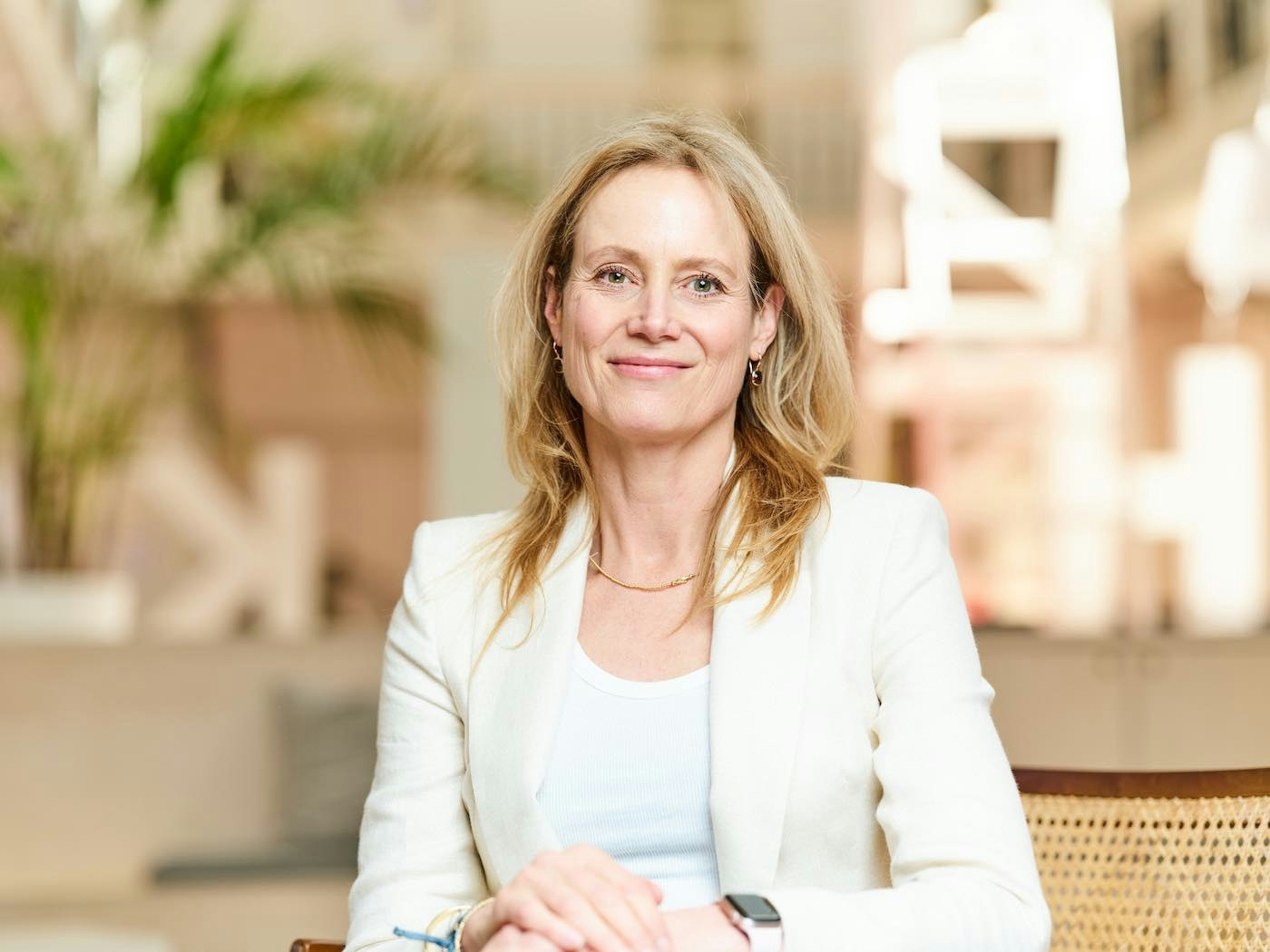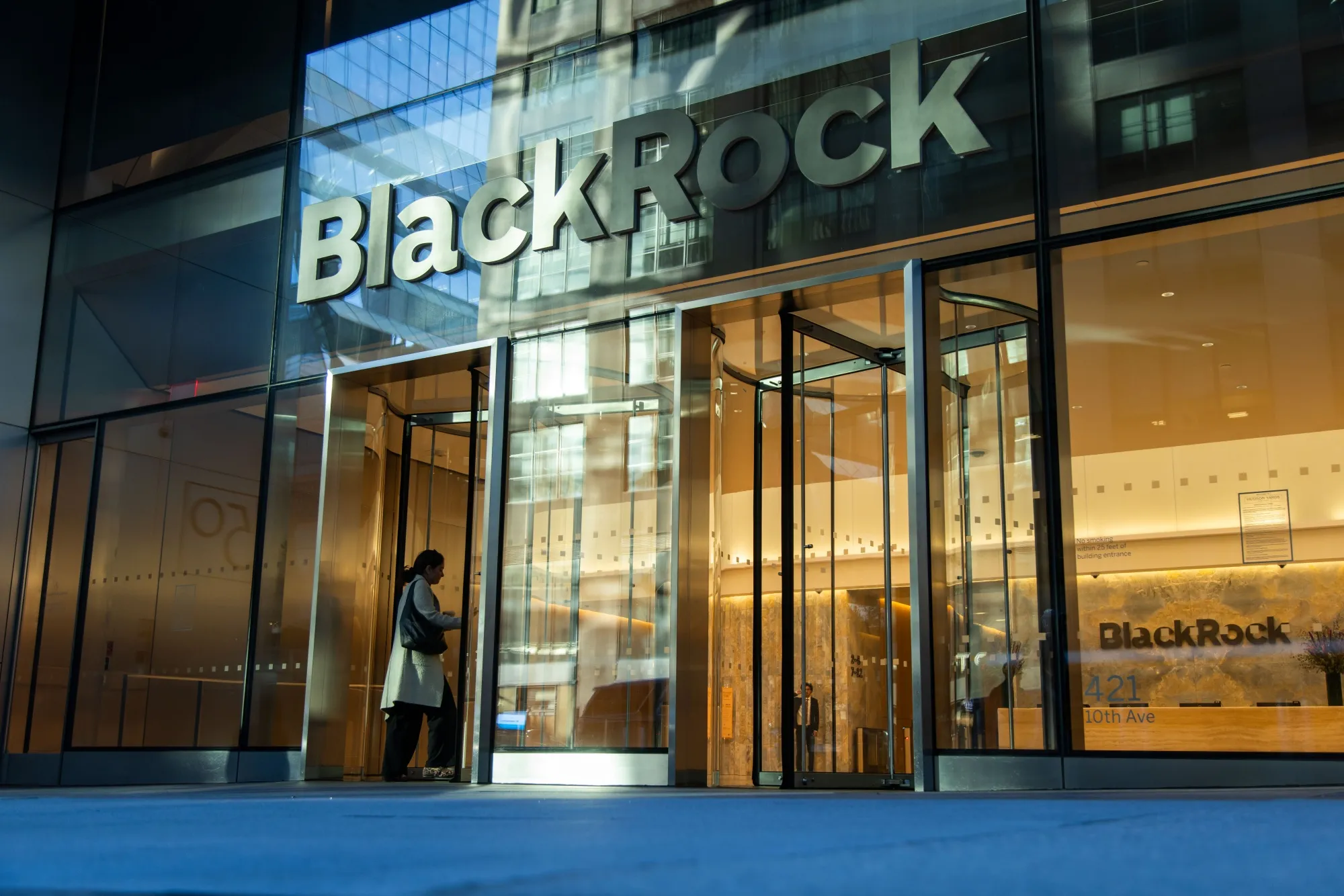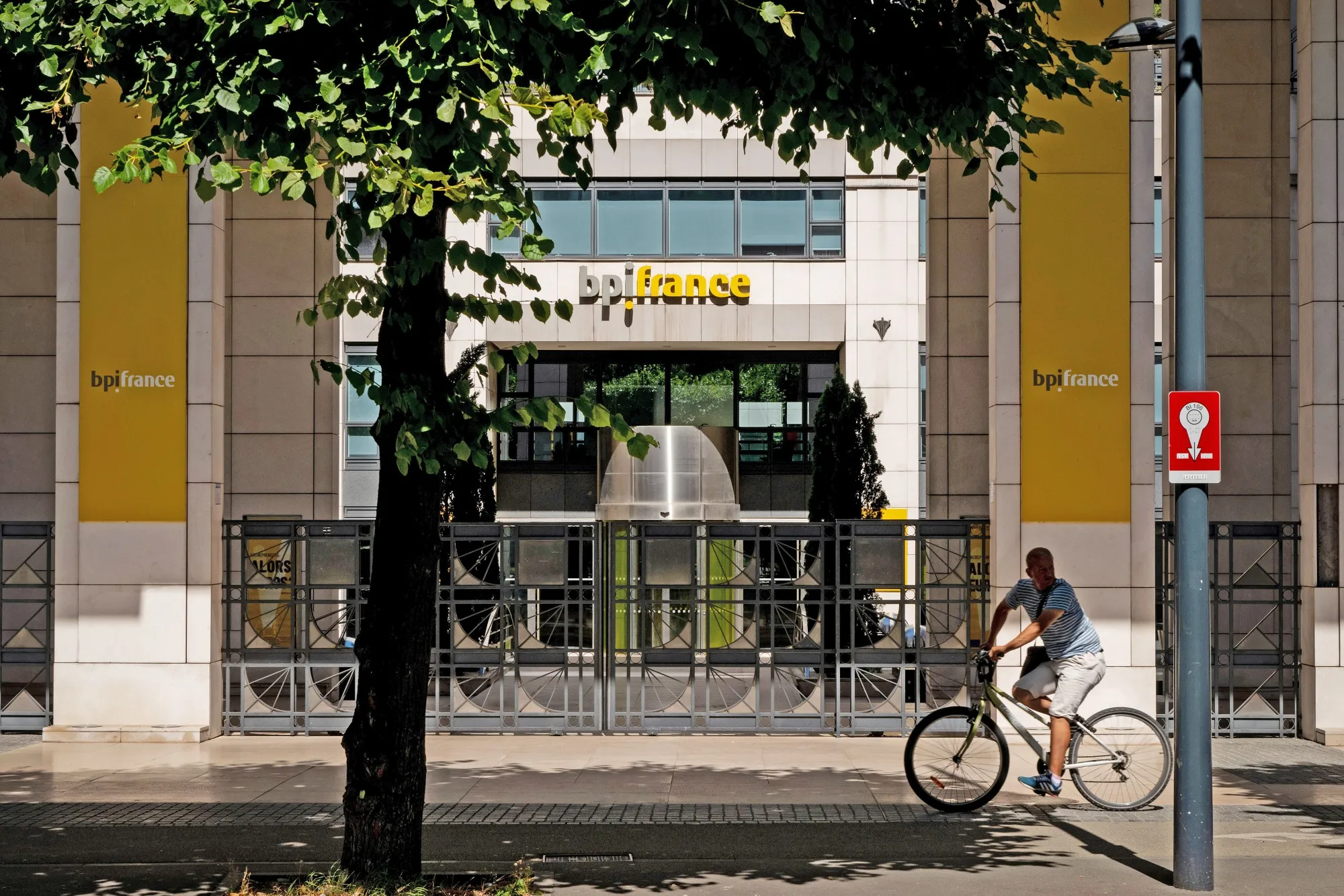Jean de La Rochebrochard, the man who invests French telecom billionaire Xavier Niel’s money in startups for a living, won’t do lunch with you.
It’s not that the head of Kima Ventures is anti-social. From the moment he plops down at the table with me at Paris’s trendy Café Compagnon, he's smiling, gregarious and relaxed, never giving the impression over the course of two hours that he would rather be anywhere else than exactly where he was at this particular moment.
No, it’s just that to balance the demands that come with being France’s most influential early-stage investor, having a family and trying to achieve personal fulfilment, de La Rochebrochard has carefully calibrated every aspect of his life. He is very serious about happiness. He even wrote a book, Human Machine, about becoming your best self.
Long, social lunches don’t fit into that life plan, which is surprising on many levels. First, it feels very un-French not to indulge regularly in leisurely lunches. And second, his dad runs a restaurant in Paris where de La Rochebrochard worked for a time in his younger days, an experience that inspired him to get involved in the whole startup adventure.
He is telling me all of this to explain why he chose this particular restaurant, located in what Parisian startuppers once called Silicon Sentier, back when France was still striving to get noticed by the rest of the startup world and you could count the number of French startups and VCs on your fingers and toes.
When I pinged him to ask if he’d be willing to meet for lunch, and he improbably said sure, and I said he’d have to select the spot because that was the point of the “Brunch with Sifted” feature, he basically landed on the place freshest in his mind.
“I ate here two days ago,” he says. “So when you said to pick a place that I like, I don't go much to restaurants. But I had lunch here and it’s nice, it’s quiet. And I had the burrata, which was good.”
The Michelin Man
It would be nearly impossible to overstate de La Rochebrochard’s influence in the booming French tech ecosystem.
Over the past decade, the two most active investors in French startups have been the state bank, Bpifrance, and Kima Ventures, the family office founded in 2010 that manages Niel’s pre-seed investments.
In 2022, Kima wrote €150k cheques to 120 startups, a pace of about two a week. Kima now counts 17 unicorns in its portfolio, including Docker, Front, Swile, PayFit, Younited, Spendesk and Mirakl. Overall, Kima has backed 1,170 companies, of which 850 are still operating.
As if that wasn’t enough, in late 2020, de La Rochebrochard and Niel joined with former Accel partner Pia d’Iribarne to launch a seed fund, New Wave, which is backed by outside LPs and writes cheques between €500k and €2m (the lines between the two investment vehicles are often blurred).
But there was no whiff of conceit, no entourage, when 39-year-old de La Rochebrochard arrived at the restaurant wearing a dark Uniqlo v-neck shirt with the sleeves pushed up to his elbows, jeans, a discrete North Face backpack and throwback Oscar Goldman eyeglasses. Only his colourful Gucci sneakers offer any hint that he might be a man of means.
Typically, a word like “brunch” is journalistic code for “not too pricey”. Café Compagnon, however, is in the Michelin Guide — so this particular assignment was “pricey”. After the meal, somewhat embarrassed, I told my Sifted editor that the cost of lunch was non-trivial. And she said to put that in the story.
So here goes. We shared an entré of the aforementioned burrata (€12). For the main dishes, he ordered the pollock, a white fish, with fregola, watercress, prawns and salsa verde (€29) and I chose the paccheri, pasta with smoked aubergine stuffing, pine nuts, pepper sauce and arugula (€25). That was followed by tarte au chocolat for each of us (€10 a pop), and coffee because, after all, we’re not savages.
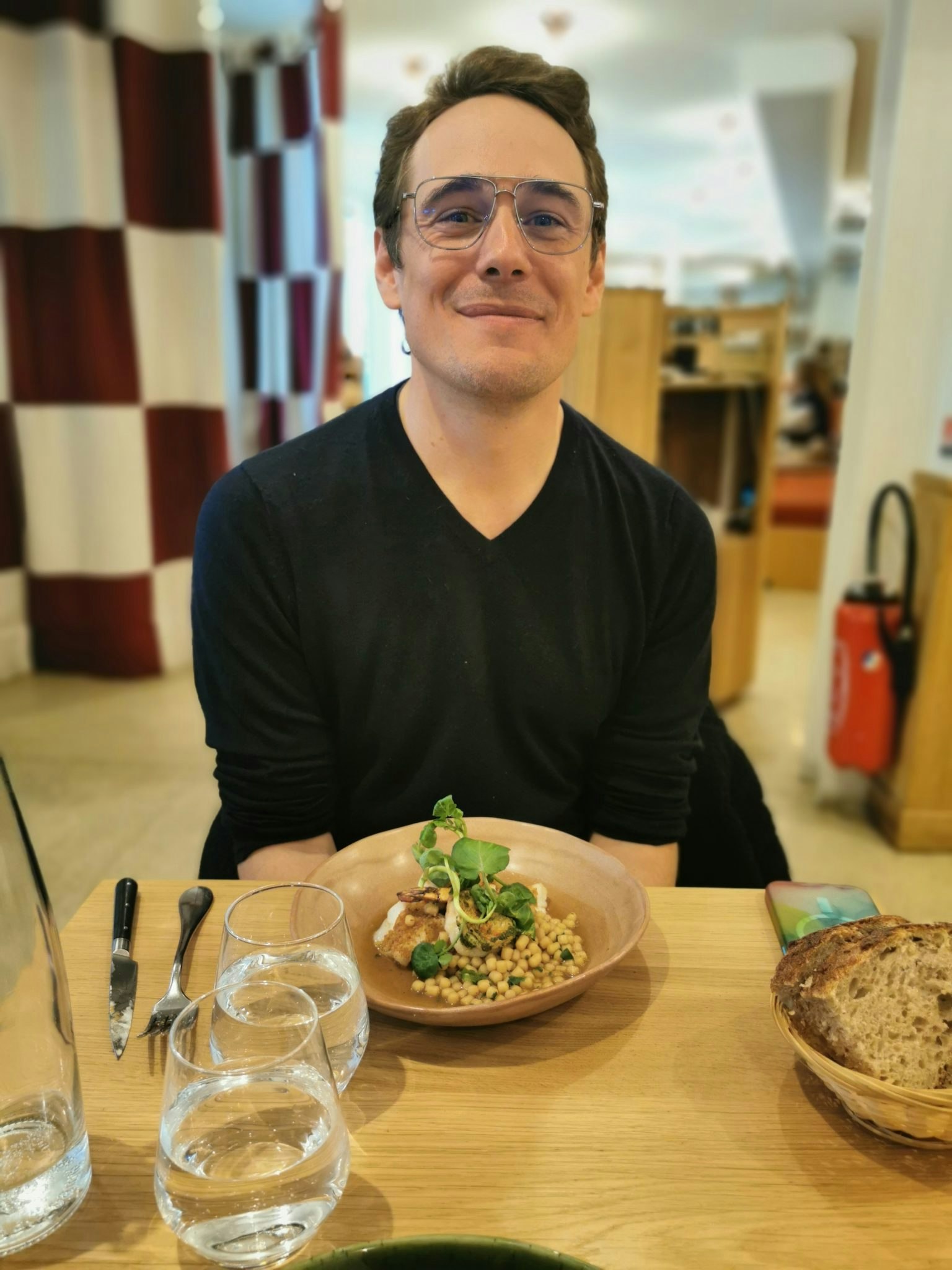
The failure
Born in the Paris suburb of Clichy, de La Rochebrochard lived in this middle-class enclave until he was eight and his parents divorced. He then moved with his mother into public housing for several years in the 13th arrondissement, one of the city’s poorer districts, where he was constantly getting robbed as he walked the streets. A few years later, his mother met someone and the family moved to the 16th arrondissement, one of its poshest neighbourhoods, where he attended the prestigious Lycée Janson de Sailly.
“It was weird, because I was in the 16th, and I was basically the poorest kid in the school,” he says.
As a student, he was a disaster. He had to repeat a grade in high school, and then he didn’t pass the exit exam known as the baccalaureate first time round. At university, he also had to repeat a year before finally graduating in 2008 with a degree in finance.
“In school, I was always bored,” he says. “I was trying to take notes, but my mind would drift away. I remember the teachers telling my parents that your kid is always daydreaming. And so since then, even today, I’ve never taken notes. My emails are my system of records.”
He wasn’t without talent or skills. Outside the classroom, he built websites for his father’s and others’ restaurants. He managed apartment rentals via the online platform VRBO, and ran digital marketing campaigns for various clients.
Following university, he sent out CVs to a hundred investment firms, landing two interviews which led to an internship with Avenir Finance and then later a job as a director at Global Equities, advising startups on M&A and fundraising.
In school, I was always bored... I was trying to take notes, but my mind would drift away. Since then, even today, I’ve never taken notes. My emails are my system of records
Still, he felt frustrated by how difficult it was to convince France’s conservative financial sector to back founders. He wanted to change track and move into investing, but once again found himself stymied.
“I applied to a bunch of venture capital firms,” he says. “Not a single one of them wanted to hire me.”
In 2013, increasingly passionate about France’s startup potential, he took a big leap and joined an upstart band of tech advisers who came to be known as The Family. Sounding a revolutionary tone, The Family’s founders said everyone could be an entrepreneur and they were there to show them how.
Working at The Family was exciting until he became disillusioned. He was deeply inspired by the three cofounders, who created an accelerator and attitude that motivated countless founders.
“I was in a precarious position with a pretty heavy mortgage, no money in the bank, a third kid coming soon, and I knew that The Family was financially unstable,” he recently wrote in his weekly newsletter. “Yet I knew it was the right thing to do and the most dynamic organisation to join at the time, even though they had less than three months in the bank to cover their costs.”
Despite the thrill, he also found The Family extremely dysfunctional. So it came as little surprise to him that it collapsed last year amid accusations of embezzlement and infighting between the cofounders.
“If you ask me whether money was stolen, the answer is yes,” he wrote in the newsletter. “If you ask me to get into the details, I won’t.”
Jean and Xavier
As he was working at The Family, he began advising Capitaine Train, a startup that sold train tickets and was eventually bought by UK competitor Trainline. He pitched the business via a cold email to Niel, who quickly responded and invested.
With a fortune today estimated at around €9bn, Niel is a French business legend for, among other things, having created the telecom company that operates the Free mobile phone service. He had turned his early-stage investing activity into a business office in 2010, named it Kima Ventures and initially hired a man called Jérémie Berrebi to run it.
At the time, de La Rochebrochard thought Berrebi must have the coolest job in the world. Following the Capitaine Train investment, he thought he might send Niel and Berrebi investment ideas from time to time. But just a month later, in January 2015, he got an email from Niel asking him to meet. Berrebi was leaving and de La Rochebrochard was offered the gig a few weeks after that meeting.
“My first thought was, I cannot fail at this,” he recalls. “No matter what, I need to make this work.”
Niel isn’t one to provide a lot of direction. After being shown the office and introduced to the two analysts working at Kima, de La Rochebrochard was left on his own to figure out the rest. “I didn’t even have a title,” he says.
At the time, the Kima team had a Tinder-like CRM system for saying "yes" or "no" to the massive number of deals that came their way. That's since been replaced by a system dubbed No-CRM that basically sorts emails into pitches and calendar invites. After writing a cheque, Kima doesn’t actively follow the hundreds of companies in its portfolio. But the team is always available when called upon by founders for advice on things like product strategy or expanding into new markets, de La Rochebrochard says.
Once the team has decided to invest, they prepare a detailed email about the deal and the startup, called a feu vert (green light), which is sent to Niel to keep him in the loop. Unless he sees a red flag, he may not even respond. As we’re speaking, de La Rochebrochard pulls out his phone and shows me the feu vert email from a few years ago for Sorare, the NFT-based fantasy sports startup that has since raised a total of $739m.
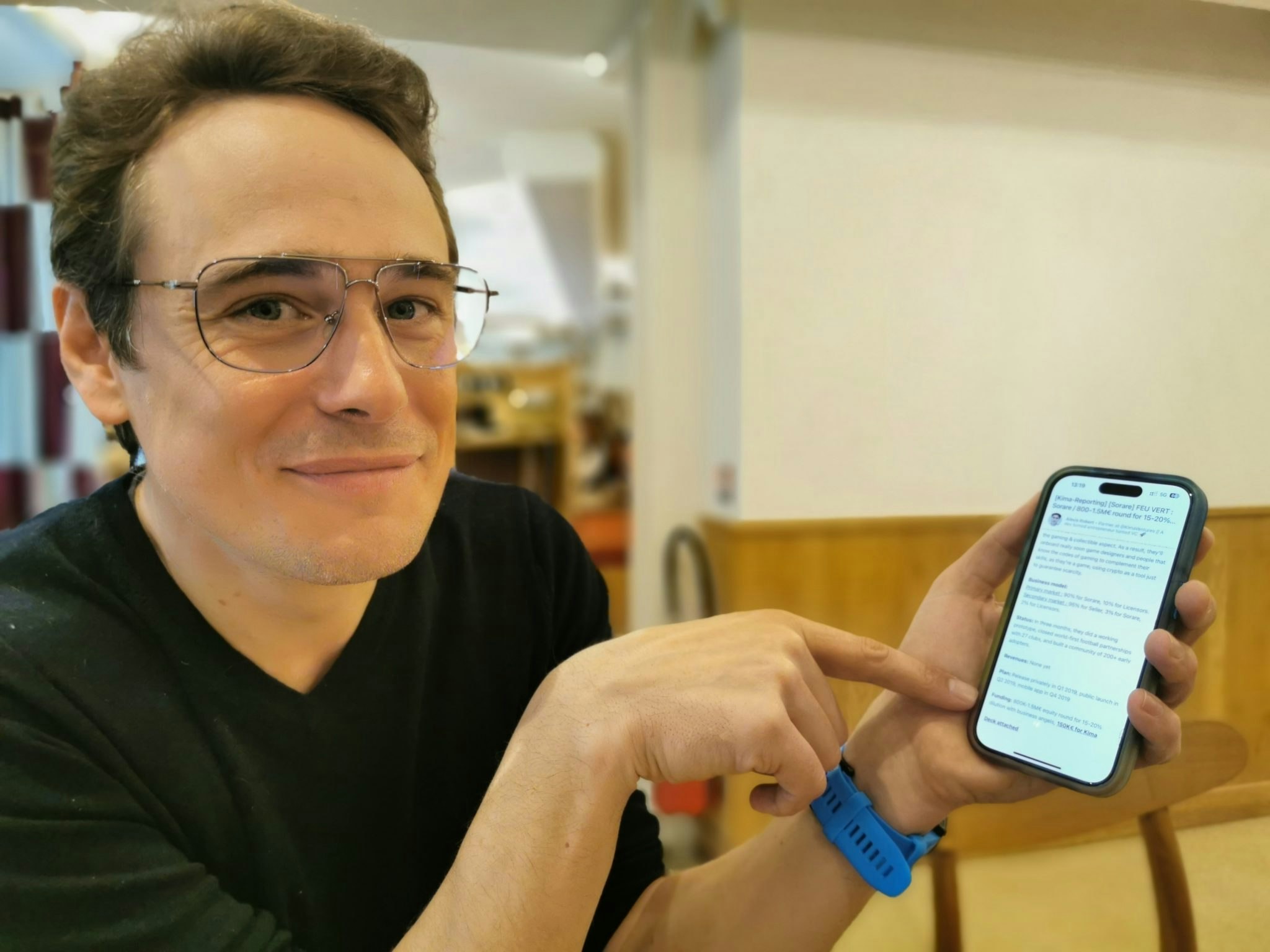
But de La Rochebrochard said that while he's expected to make good returns for its only limited partner, Kima plays an equally important role in keeping Niel tuned in to what innovation is happening.
“Kima is not how he makes money, though, of course, we do make money,” he says. “It allows him to be always aware of what's happening, about the trends. It’s a way to be intellectually curious about everything, and to remain the entrepreneur that he has always been.”
I suggest that Kima essentially serves as Niel’s startup nervous system.
“My role is to be his proxy, to absorb everything and to feed it back to him,” says de La Rochebrochard. “And that's the way it works. And the thing is, whenever there is a company raising money in France, a large sum of money, I will always receive a text like, ‘Did we invest in this one at the seed round?’”
This fuels de La Rochebrochard’s obsession to never miss a deal. That has become a bigger challenge as the number of seed funds and business angels has expanded in France in recent years.
Once, every French founder would pitch Kima. Now he worries that some founders see Kima as a commodity or think it has too many companies in its portfolio — although he’s confident that Kima knows this early-stage terrain better than anyone.
“My job at Kima is to make sure that every good deal in France has been funded at some point by Kima,” de La Rochebrochard says. “When I reach out to Nicolas Cohen at Ankorstore and he tells me, ‘Sorry, we started fundraising on Monday and we closed on Wednesday and we have no room for you guys,’ I’m mad at myself for six months. I know it’s one deal. But every deal counts. I think when you start being content with the fact that you had 95% of the deals, you start losing. You need to fight for every single deal. It’s easy to get lazy in the venture capital world.”
The human machine
To avoid being overwhelmed by emails, meetings and deal flow, de La Rochebrochard gradually developed a fairly rigid system for managing his time.
He takes meetings from 2pm to 5:30pm, never longer than 30 minutes, and rarely does outside lunches (lucky me). The goal is to be solely focused on his family — his wife, and three children aged 9 to 13 — by 7:30 pm at the latest. He comes to Paris on Thursdays and Fridays and returns home by train in the evenings to Aix-en-Provence in the south of France, where he moved three-and-a-half years ago to escape the Parisian jungle.
He unplugs on the weekends until late Sunday afternoon when he tackles email until he’s at inbox zero. Like Niel, de La Rochebrochard responds to every email, though most are just short acknowledgements that he is passing on a deal.
In many ways, de La Rochebrochard is trying to live up to Niel’s reputation.
“Xavier has his reputation of answering all these emails very quickly, when he receives probably two, three, four, five times more emails and ideas,” he says. “I have no excuse not to respond to anyone. It’s my job to be his proxy. And as his proxy, I need to answer every single person who reaches out to me and make sure I leave a good mark.”
That work discipline — being organised like a machine in order to live like a human — has allowed him to carve out time for road cycling and training for an upcoming Ironman competition.
It’s an optimised life.
“I've reflected a lot about who I am as a person, my qualities, how I react when I'm stressed, and when I'm too confident,” he says. “The more you understand about yourself, the more you can adapt.”
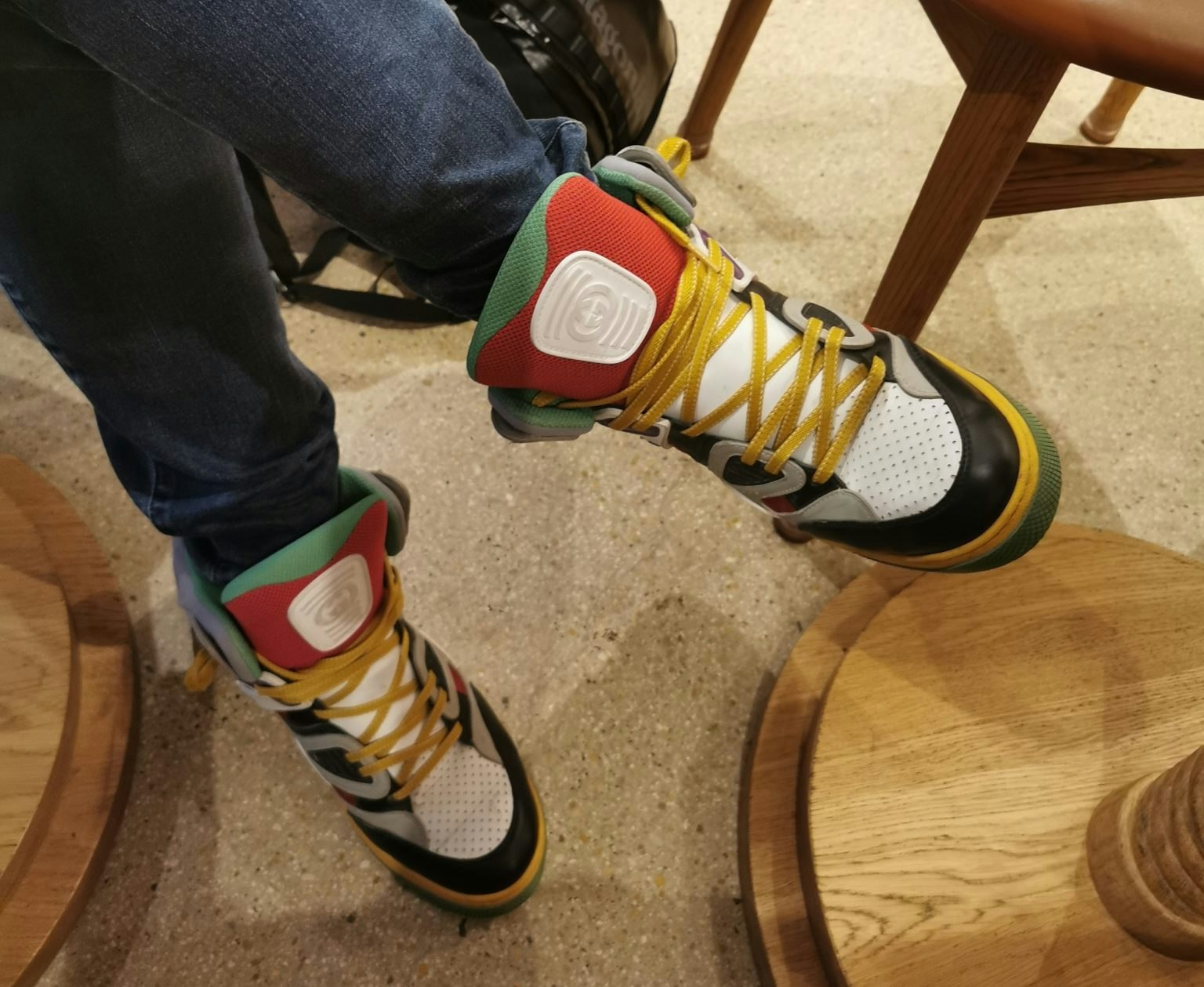
But the man — who has been smiling and laughing almost all the way through our lunch — is about as human a machine as they come.
“You are basically a major kingpin of the French tech ecosystem,” I say, as we finish our tartes au chocolat, mixing in the little scoops of melting vanilla ice cream. “Does it weigh on you? Do you feel like you have a certain responsibility? Do you ever think, ‘Yeah, I’m the man.’”
He just chuckles.
“My view on that is that if I disappear tomorrow, within three months I will be forgotten,” he says. “Someone will take my place and nothing will change. Nothing will get better or worse. I’m very replaceable. Sometimes I feel like because we've been here for so long, and I've been here now for eight years, I'm becoming a commodity. I don't want to become a fucking commodity. I want people to reach out to me and say, ‘Yes, I still want to work with you.’ That's what I fear. I don't want to be forgotten.”

